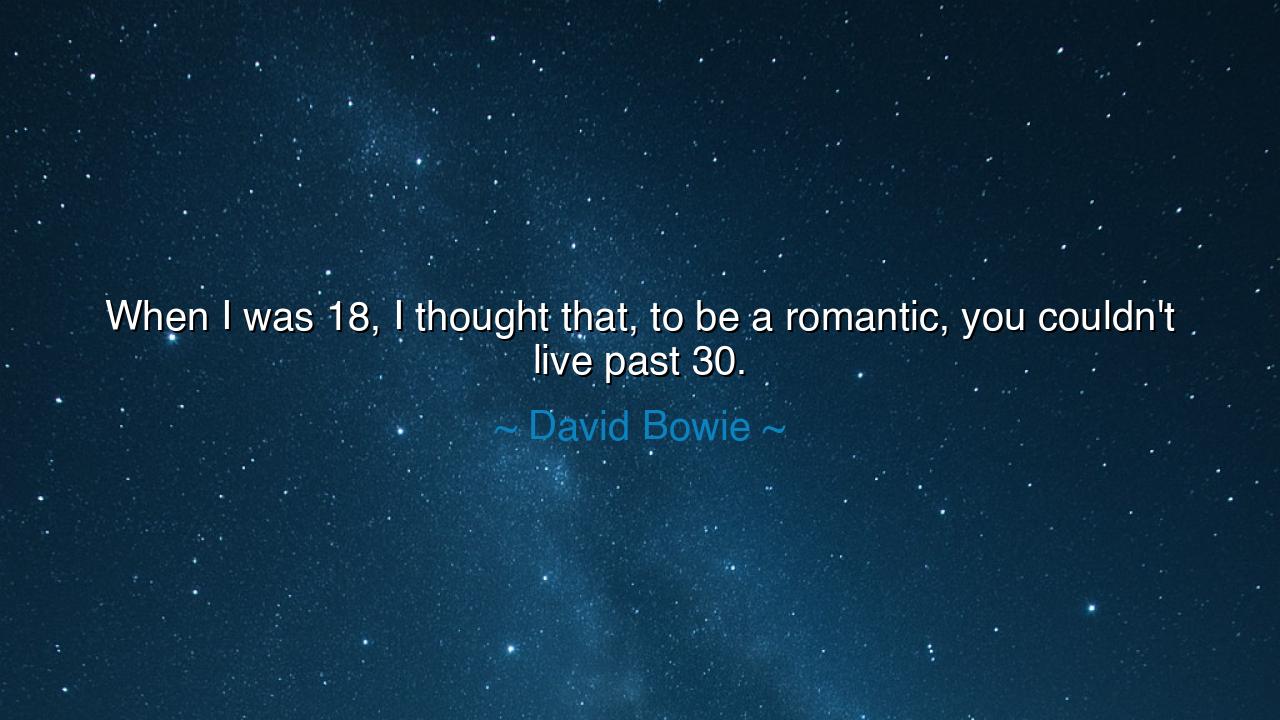
When I was 18, I thought that, to be a romantic, you couldn't






In the words of David Bowie, the eternal chameleon of music and art, there burns the raw flame of youth: “When I was 18, I thought that, to be a romantic, you couldn’t live past 30.” This is the voice of a young man caught in the fever of passion, convinced that beauty lies in brevity, that authenticity demands a life burned quickly and extinguished before the weight of years could dim its fire. It is a confession of the ancient idea that greatness and youth are bound together, that to grow old is to betray the soul’s poetry.
The ancients themselves told such stories. They sang of Achilles, who chose a short life of glory over a long life of obscurity. They mourned the tragic deaths of poets and heroes, gone before their time, leaving behind only the dazzling afterglow of their genius. To be a romantic, in this youthful vision, is to live with such intensity that longevity itself feels like compromise. Bowie, in his 18-year-old certainty, stood in that tradition: believing that truth, art, and passion must blaze like a comet, not endure like the sun.
Yet even in this vision there is paradox. For what is romantic? Is it not the longing for the infinite, the refusal to bow to dullness? And might it not also be found in the act of surviving, of reinventing, of carrying the flame across decades rather than snuffing it out in one brief burst? Bowie himself, who lived far beyond 30, would prove this. He showed that romance is not only in dying young, but in refusing to die inwardly—keeping the spirit wild, creative, and hungry through the seasons of life.
History bears this out. Consider Lord Byron, the great Romantic poet, who declared, “I want a hero: an uncommon want.” He lived recklessly, passionately, and died at 36, leaving behind verses that still smolder. His life embodied the belief Bowie once held. And yet, consider also Leonardo da Vinci, who lived to 67, never ceasing to explore, never ceasing to create. His life teaches us that the romantic spirit can endure not only in flame, but in persistence—in a lifelong hunger for beauty and truth.
The deeper meaning of Bowie’s words is that youth often confuses passion with destruction, believing that to be authentic is to be short-lived. Yet wisdom teaches otherwise: passion is not diminished by years, but refined. The young heart burns hot, but the older heart burns steady, and both are flames worthy of reverence. Bowie himself came to embody this truth, not by fading early, but by continually transforming, proving that the romantic soul need not wither as the body ages.
The lesson, then, is clear: do not chain your passion to the idea of youth alone. Do not believe that to grow older is to grow dull. Instead, carry the romantic fire with you always, whether you are 18 or 80. Keep seeking, keep longing, keep daring to create. For romance is not defined by the brevity of life, but by the intensity with which you live it, in every season.
Therefore, O listener, take these words to heart: you do not betray your romantic spirit by living long. You betray it only by ceasing to dream, ceasing to love, ceasing to risk beauty for fear of failure. Live, then, not as a candle consumed in one blaze, but as a fire that dances through the decades, ever changing, ever alive. In this way, you will honor both the wildness of youth and the wisdom of age, and your life will shine with a radiance that does not end.






AAdministratorAdministrator
Welcome, honored guests. Please leave a comment, we will respond soon